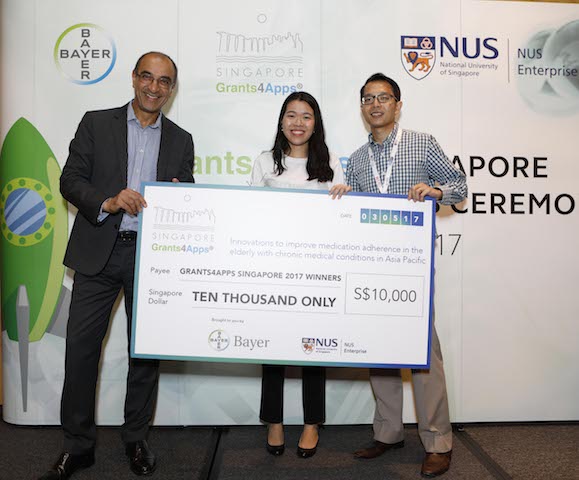A solution to help with compliance
A multidisciplinary team from NUHS Department of Ophthalmology has developed a medication card and wearable for elderly glaucoma patients to help them understand their medication regimes and remind them on their eye drops.

Dr Kemal Malik, member of the Board of Management, Bayer AG, with EyeDEA, a winning team from Singapore.
A multidisciplinary team from the National University Health System (NUHS) Department of Ophthalmology comprising of ophthalmologists, programmers, engineers and medical students, have developed a two-in-one medication card and wearable device called EyeDEA to increase compliance to eye drops in elderly glaucoma patients. The team was one of three winning teams at the inaugural Bayer’s Grants4Apps Singapore, a Web-based crowdsourcing that calls for innovative health-tech solutions to improve medication adherence in elderly people with chronic diseases across Asia-Pacific.
Explained the EyeDEA team, “Compliance is a major issue in patients with glaucoma – with up to 80-percent non-compliant to their medication based on a study conducted at the National University Hospital (NUH) Eye Surgery Centre. Many of our elderly patients struggle with their eye-drop regimes that can change during their outpatient visits. Our patients could be on as many as five eye drops, that may have to be administered at different times throughout the day. Thus, it comes as no surprise that many patients find it difficult to remember and understand their eye-drop regime.”
Along with collaborating professors in pharmacology at the National University of Singapore (NUS), the team came up with a personalised wallet-size medication card with patients’ medications in easily-understood visuals, which help to improve patients’ understanding and recall of medication regimes.
They also have a customised wearable device with an alarm that reminds and tracks these patients’ usage of eye drops. The data will then be shared automatically with physicians and caregivers. This device is particularly targeted to elderly glaucoma patients in Singapore who typically do not own smartphones and have poor vision, which limits their ability to effectively use mobile applications with typical small font sizes.
Under trial
One year in the works now, a prototype is currently under trial with elderly glaucoma patients on three or more eye drops at the NUH Eye Surgery Centre. Shared the team, “The response has been very positive so far. We intend to gather this feedback to further improve the device in the future.”
From their initial observations, the team said that many patients were unfamiliar with the drug names of their medications, and instead identified their medications by the bottle packaging. “Hence, they experienced some difficulty when their ophthalmologists explained their eye-drop regimes, using drug names, during the consultation. They have remarked that the card would greatly help their understanding, as a visual aid.
“Family members who may not be available to accompany the patient to the outpatient consultation at the hospital, have stated that the card would be a simple way to understand and be updated of any changes to the patient’s medication regime.” Besides for glaucoma medications, the card-and-wearable solution has the potential to be used among other patients who require multiple medications in the form of tablets, inhalers, topical creams and more.
Besides EyeDEA, two other teams were also awarded S$10,000 each and access to mentorships, incubator space, and global and regional networks. Glycoleap by Holmusk (also from Singapore) is an app that monitors diabetes patients’ food habits, glucose readings, activity levels, weight and medicine adherence on a daily basis. It allows dieticians to find out if their patient has forgotten to take his or her medication. PillPocket (from Thailand) provides personal healthcare assistance from pharmacists for patients with high blood pressure, high blood cholesterol and diabetes. It comprises a chatbot linked to pharmacist services such as follow-up care, supporting medication refill, home delivery and even free patient case management. PillPocket also has a medication reminder function which triggers alerts via chat.
A total of 80 applications were received from countries including Singapore, Thailand, India, Australia, Taiwan, South Korea and the Philippines.
(** PHOTO CREDIT: Bayer and NUS Enterprise.)

0 Comments